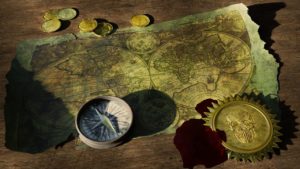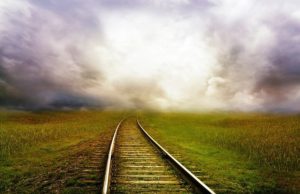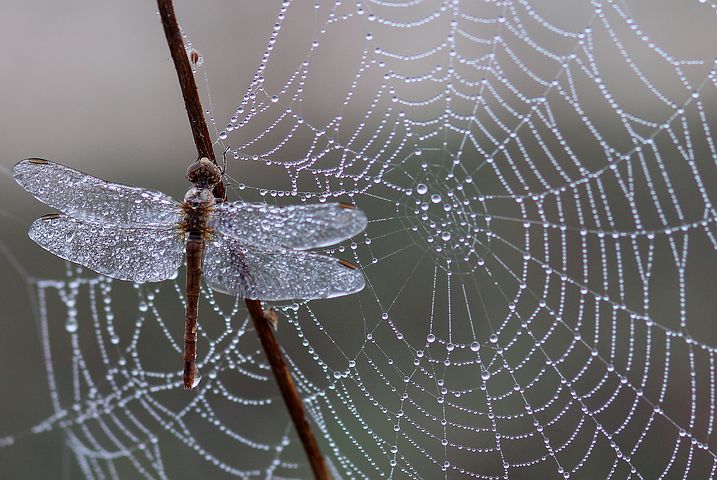An Uncharted (Ancestor) Land
When you think about it, modern ancestor veneration is kind of like trying to navigate a territory that was once known but long abandoned. Maps are not  easy to find now, and the only thing we have in our favor is some acquired knowledge of similar landscapes. So it’s no wonder that we encounter pitfalls.
easy to find now, and the only thing we have in our favor is some acquired knowledge of similar landscapes. So it’s no wonder that we encounter pitfalls.
However, there are three main pitfalls in this ‘landscape’ that I can warn you of, and that is what I’m going to be covering today. (Warning folks, this is going to get pretty salty.)
1. A Lack of Proper Boundaries
The first and biggest pitfall in this Valley of Death is becoming overly familiar with the ‘locals’. The dead are not the same as the living, and while this valley can be undeniably beautiful and familiar-feeling, it is not a place where you can become too familiar.
Because those who become too familiar with it tend to become a part of it.
For the ancient Greeks, this was expressed by the concept that the dead were polluted, and that pollution could spread to the living (and eventually cause sickness and death). The Norse were more direct in their beliefs, simply believing that the walking dead brought disease. In both cultures, a level of separation (albeit differing) was observed between the living and dead.

It should be noted here though, that not all human cultures observe such separation from the dead. For example, while the Greeks took extensive precautions to ensure that separation, practitioners from cultures with non-dualist worldviews often frequent places thick with the dead to no ill effect. As always, consensus reality must be taken into account, and we inhabit a consensus which oscillates wildly between extreme taboo and over-familiarity towards death and the dead.
In other words, our boundaries here (as in so many areas of life) are FUBARed, and no one needs to go for a night out on the graves with non-dual checks their asses can’t cash.
So caution it is.
When it comes to the dead there is a simple rule to remember: the greater the proximity to physical remains, the greater the power and greater the caution required.
This means that those of you who are inspired to take up Cult of the Dead graveside practices, or work on battlefields filled with remains or burial mounds, will need to observe a greater level of purification than those of you simply honoring your ancestors at a home shrine with no physical remains.
Purification can be as simple as washing your feet off (you can leave your shoes on) with water when leaving a place of burial/death, or taking a pinch of salt between three fingers, then putting it on your tongue and drinking it down with clean water. I do both and recommend both as initial practices (trust me, you’ll feel better for it). You can also take a bath with purifying herbs, or showering with soap made with purifying herbs. This is also a good option, as is the use of récels (purifying smoke, incense). Good herbs to use here are mugwort, rosemary, vervain, juniper, and hyssop. I also make an oil of hyssop, rosemary/vervain/juniper + a little something from the Testament of Solomon oil for on the go that I’ve had great success (and great reviews for).
But if you bring nothing else with you to the place of the dead, bring water and salt. Those are your basic necessities. Something of iron is also good to carry with you – just in case the dead get a little…testy.
The home shrine is a more relaxed affair, but still some taboos are best observed. These can vary wildly too – in some cultures, ancestor shrines are kept hidden from all but family and closed off in some way. In other cultures, the shrines are open and a part of the home. This second model is the one that I follow as I have no physical remains and well, that’s just what I grew up with. Still, despite my more relaxed approach here, I observe certain protective measures. For example, I keep to the rule that what is used for and given to the dead is theirs and no longer for living use. I keep it clean, and don’t allow offerings to rot. And if I’m actively calling upon them for counsel, I do so using a variation of the Art Armadel (basically summoning their spirits them into a bowl of water and then scrying the answers) so that they remained more contained and manageable. Prayers are family events as the level of interaction is far less intense than when I’m actively engaging with them using more sciomantic ritual tech.
One final thing I’d like to mention before moving onto the next point though, is that when I’m done with my interactions at the ancestor shrine, I end by walking three steps backwards and bowing before moving on with my day. It’s something that my ancestors told me they wanted me to do, and it has become habit in other settings too. As I would go on to discover, not turning your back on the dead is a common practice among some groups.
The dead often lie, but the elevated ancestors often have good advice. Discernment is key.
Judging the Actions of Our Dead
For the vast majority of European-descended peoples, it’s an undeniable fact that many of our dead did some really shitty things, things that may make us have some pretty uncomfortable feelings. Some of us might tell ourselves that those things were “just the way things were”, or that “it was conquest, and that shit just happened”, and yes, that might ease those feelings somewhat. But if we’re being honest with ourselves, when we cling to excuses like that, we’re only doing so because deep down we know that what was done was wrong. We’re just seeking an escape from the feelings.
Now don’t ‘at’ me on this. As the daughter of a nation that fucked with all but something like 22 countries in the world (and adopted daughter of a nation currently racking up its own score), I know this one really well. And I’m coming to tell you that if you’re doing this, you’re only hurting yourself in the long run.
Why?
Because in order to cling to those excuses, you need in some way, to continue to hold the cultures that were harmed by the actions of your ancestors as being somewhat lesser – “deserving” of it maybe even. And well, where does that get you? That lands you on a train that will probably eventually take you to

‘Racist Fuckhead Town’.
But here’s the thing about racism: it’s not about power. Well, it is in one sense – the sense of having power over somebody. You may even get that. But it doesn’t empower you where it counts, because people only usually want that kind of power over others because they’re scared on some level.
The sad truth about racism (if I’m being extremely charitable), is that the vast majority of racists are shit scared of people who are different from themselves. They cling to the differences and find ways to shift blame to recast themselves as victim. They cling to the things that enable them to avoid those negative feelings.
And they create a world of angry, sick ghosts in the process.
On the flip side, you have what is referred to as “cancel culture”, and when it’s applied to ancestor veneration, this is just another form of putting your head in the sand. Sure, these people feel the wrongs of their ancestors deeply. However, “canceling” those ancestors is nothing more than an easy way out. Humanity can be monstrous, we can be the most evil beings in existence. “Canceling” ancestors not only enables us to avoid grappling with the fact that we are all capable of some truly terrible things given the right (or wrong) circumstances, but limits our ability to engage with our feelings on the harms of our ancestors to a surface, mostly seemingly performative level.
“See?! I’m one of the *good* ones! I cut all the bad ones out!”
In my last post, I talked about the effects of our ancestors upon us. If they can affect our crops, our fertility, and prosperity (as people believed), they can affect us in other ways too. You ever wonder why we never seem able to move on as a society from the same old bullshit over and over again?
The dead affect us regardless of our feelings about them, and you’d better believe they have opinions and want to work their will in the world!
But you can’t lay those ghosts if you ignore them or take them for something they’re not.
An Obsession with the Ethnicity or Culture of One’s Ancestors
The final pitfall is something we see so much of in modern Heathenry (but also in other forms of Paganism), and that’s an obsession with the ethnicity and culture of one’s ancestors. This is the most toxic potential endpoint of ancestor veneration, and if I’m being truthful, we let it go too far and fester for far too long.
Okay, a bit of real talk here.
Modern Heathens spent way too long pretending that Folkish Heathenry was the weird (but kindly) uncle that said sort of fucked up shit at Thanksgiving that we’re all so apparently used to ignoring from relatives. Because of this approach, the rot took root, and it’s going to take an extremely concerted effort to kill that I honestly don’t see from most modern Heathen groups. We called it ‘folkish’ and ignored the racialist-then-nazi roots of that term. We ignored the work of people like Mattias Gardell back in two-thousand-and-fucking-THREE that demonstrated the nazi-fapping, white supremacist fuckery of it all. We pretended that it was ‘just a different POV’, and came out with the bullshit Jarnsaxa scale as though it was some kind of sexuality or gender spectrum instead of calling it for what it was.
And then we all screamed like it was a big fucking surprise in 2016 when the AFA came out of the white supremacy closet and opened the floodgates.
I mention all of this, because these people trade in a jaded and perverted view

of ancestor veneration. It’s one of their biggest hooks in a society full of people looking to feel rooted and belong. They cloak themselves in cultures that are no longer theirs, and make themselves gatekeepers because some of their ancestors hailed from some of the places they associate with their favorite fantasy of “greatness” (which when you get down to it isn’t all that different from the sword and sorcery fantasies of the 80s).
But this isn’t really about ancestors or ancestor veneration. Because if it was really about ancestors then they wouldn’t fixate on the culture and ethnicity of a relatively small percentage of ancestors so much. (It’s a little “one drop rule” if you hadn’t already noticed>)
Ancestor veneration is about people, not race or culture. It’s a human story, and most of those humans in all of our lineages, when you go back far enough, had different levels of melanin in the skin, different languages, and different cultures. Moreover, we’ve been sleeping with whoever looked good since fuck knows when (which is how most of us have a small percentage of Neanderthal DNA btw). Boom chika wow wow.
When we focus on anything other than that, when we extract and isolate our favorite bits from the story of our ancestors and make those small pieces the whole, we’re not engaging in ancestor veneration. That’s nothing more than wish fulfillment and yearning for a “halcyon” time (for white men mostly) that never existed because the modern world can be scary. That is not taking the ancestors as they are. That is not honoring them. That is using them as a tool.
An Uncharted Land is a Hard Land
As these pitfalls demonstrate, ancestor veneration is not an easy practice – especially in our broken society, and especially when you have a shitload of ancestors who most likely did some really awful things. However, we live in a world of ghosts – of dead who both affect us and have some pretty strongly held opinions about current events – and we lack both the resilience and ritual tech to mitigate their negative effects on our reality. In my next post, I’m going to share an account of an ancestor veneration rite in which the dead made their opinions on current events strongly known and share some ways in which you can begin connecting with the dead and ancestors.

